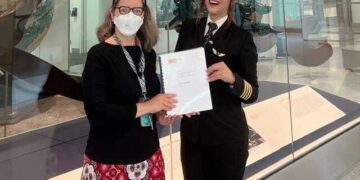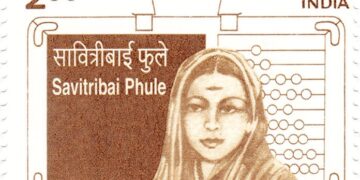Women Entrepreneurs Spurring India’s Economic Progress
Dr Chaitra Harsha, MD of Vipragen Biosciences, is making strides in the field of social entrepreneurship and healthcare innovation with her multiple skillsets and cross sectoral exposure
The AsiaBerlin Summit which is an event held by the German government to bring together all the stakeholders involved in the creation of a favourable ecosystem for startups was held from September 12-16 in Berlin, Germany. The summit was originally envisioned and initiated in 1997 and has constantly worked to encourage startups and the startup ecosystem to develop across the world. This year’s focus was to promote sustainable development goals within the startup ecosystem.
Representing the growing tribe of women entrepreneurs in the country, Dr Chaitra Harsha, MD of Vipragen Biosciences, was among the delegation from India. She is a renowned personality in the field of social entrepreneurship and healthcare innovation with her multiple skillsets and cross sectoral exposure.
Dr Harsha is an alumnus of the prestigious Indian Institute of Science (IISc) and is a medical doctor by training but instead of clinical practice, opted to pick a career in research. She also took up a course at the Indian Institute of Management (IIM) in Bengaluru designed to aid women entrepreneurs by teaching certain core business principles.
Dr Harsha has been a key participant representing India in many events including the Global Economic Dialogue in Hamburg, Germany and had also attended the World Economic Forum (WEF) where she literally rubbed shoulders with Ivanka Trump.
In addition to this, she is also a Charter Member of TiE Bangalore Chapter, where she actively mentors budding women entrepreneurs. Dr Harsha’s Vipragen, a team of dynamic individuals, is a Contract Research Organisation (CRO) helping global organisations focus their resources on the research and development of new drugs, treatments, vaccines etc. by outsourcing their pre-clinical trials.
The journey of India as a potential drug developmental destination started in the late 20th century but the recent restructuring of the regulatory process and increased capacity building has certainly helped to establish India as one of the leading innovation and manufacturing hubs. The global CRO market size is projected to reach USD 1,24,230 million by 2027, from USD 58,000 million in 2020, at a CAGR of 11.4 per cent during 2021-2027.
Research and manufacture of medical devices and therapeutic drugs are prime drivers of the market. Increasing investments in research and development, the emergence of pharmaceutical and biopharmaceutical companies, and the patent expiration of drugs are expected to bolster the CRO market growth. The availability of quality healthcare practitioners – which automatically lowers the cost of conducting clinical trials across all phases – offers a huge potential for India in this sector. This has led to a boom of CROs offering affordable and quality services to global pharma companies.
Vipragen Biosciences, a Mysore-based preclinical drug discovery company is one such organisation. With a team of passionate and dynamic individuals, Vipragen has put a foot forward in the areas of medical devices, analytical chemistry, inhalation toxicology, in vitro toxicology and other areas of preclinical discovery and development which will take shape in the coming year.
After completing her MBBS, Dr Harsha went on to get her doctorate from the prestigious IISc, Bengaluru. At IISC, she was researching vaccines against tuberculosis (TB) as part of her PhD. Before being a part of Vipragen in 2016 along with Dr Chandrasekhar, also an IIScian, Dr Harsha has donned several hats including setting up dental clinics, starting a medical tourism venture and consulting in the area of bioinformatics, among others. She has also has done the Management Programme for Women Entrepreneurs (MPWE) from NSRCL for Entrepreneurship, IIM, Bengaluru.
Vipragen offers pre-clinical research services to biotech and pharma R&D companies, both within and outside India. Pre-clinical research involves early-stage research where potential drugs are tested on animals for safety and assess for feasibility to conduct human trials. Initially bootstrapped through funds from family and friends, Vipragen’s growth curve was further supported by Indian angel investors and KITVEN, a Karnataka government venture fund that supports entrepreneurs.
Vipragen proudly boasts of a 25,000 sq. ft. research facility at Mysore which meets the global standards of European and American regulators. Manned with more than 50 employees, nearly half of them are scientists and about 35-40 per cent are women. In addition to contract research, Dr Harsha says she received grants from the Department of Biotechnology, Government of India on five projects linked to internal asset development.
The company is conducting early-stage research on a seaweed-derived natural polymer that can be used in the treatment of diabetic foot ulcers, a potential anticoagulant drug, two in-licensed antibiotics from Jawaharlal Nehru Centre for Advanced Scientific Research, Bengaluru for treating multidrug-resistant (MDR) bacteria, and a drug for treating Parkinson’s and Alzheimer’s diseases.
Speaking about the value that CROs bring to the table Dr Harsha says, “The need to handle increasingly complex drugs and clinical trials is expected to drive a Contract Research Organisation (CRO). Drug development has become more difficult due to advances in cell and gene therapies, antibody-drug conjugates, cytotoxic chemical products, and in vitro and in vivo processing procedures. By hiring a CRO sponsor one can save time negotiating the regulatory and legal constraints that the company may not be familiar with”.
A CRO may have more experience with these procedures and requirements, and thus be able to ensure that all rules and regulations are followed more swiftly and efficiently, speeding up the clinical trial process. This is expected to further drive the CRO market. Western drug companies have been looking seriously at India for research help since 2005, when the country started to comply with the Agreement on Trade-Related Aspects of Intellectual Property Rights, or TRIPS, a globally recognised intellectual property pact, The new law roused the drug industry’s interest in India for affordable access to highly qualified scientists.
While most of India’s startups and unicorns have emerged in the IT sector Dr Harsha says the development of indigenous vaccines for Covid-19 in a very short time has brought a paradigm shift in the mindset of investors in the life sciences sector which have a long gestation period compared to those in the IT sector.
Hoping for better research and industry collaboration in future Dr Harsha is confident that if the industry and research complement each other like it did during Covid-19 vaccine development, the life sciences sector has a bright future in India. When asked about how she manages the stress that comes with being an entrepreneur Dr Chaitra says, “Women who are usually more organised, meticulous and patient make better entrepreneurs than men.”

















































